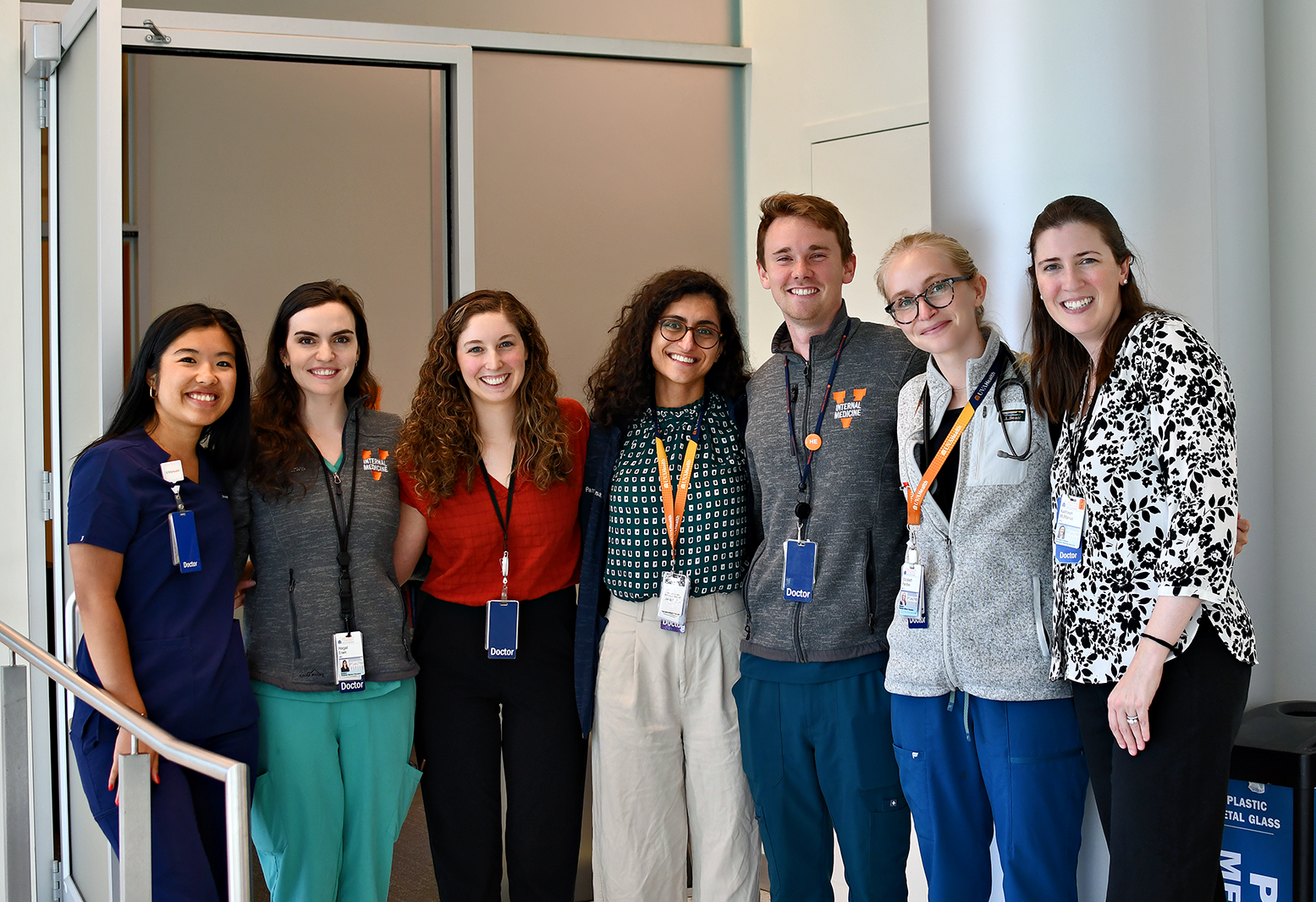HIV Primary Care Track

2024-2025 Residents with Dr. Kate McManus
The HIV Primary Care Track provides a unique opportunity for residents to learn to deliver comprehensive HIV care while addressing the needs of vulnerable and stigmatized patients. It is an immersive experience tailored for aspiring primary care physicians interested in incorporating HIV medicine into their practice or those who want to pursue an Infectious Diseases fellowship focusing on HIV care. By becoming a part of the University of Virginia Ryan White HIV Clinic team, residents are exposed to the realities of individuals facing social, economic, and healthcare disparities, and by working with the clinic team, residents can connect patients with a clinic and local resources to address these issues.
Residents manage a continuity panel of approximately 25 patients at the Ryan White HIV clinic, focusing on HIV care, primary care, sexual health, and addressing social determinants of health. The track integrates the National HIV Curriculum, comprising asynchronous modules with scheduled assessments and additional in-person educational sessions. By the end of residency, the residents have met the requirements for the American Academy of HIV Medicine HIV Specialist certification exam. Residents apply for positions during the intern year. If selected, the resident will have one continuity clinic in the Ryan White clinic during each ambulatory week of their second and third year of residency.
- Patient Care: Providing whole-person care for HIV patients, including treatment initiation, management of co-occurring conditions, preventive measures, addressing social determinants of health, and developing expertise in sexual health history-taking and management of sexually transmitted infections.
- Medical Knowledge: Understanding HIV screening, virology, immunology, pharmacology, treatment selection, monitoring, and primary care considerations.
- Systems-Based Practice: Understanding the clinic’s funding, working with the clinic team to coordinate patient care, shared decision-making, identifying areas for improvement, and advocating for patients.
- Practice-Based Learning and Improvement: Setting learning goals, analyzing patient data, and recommending interventions to enhance care quality.
- Professionalism: Demonstrating compassionate care, respect for team members, ethical decision-making, timeliness, and recognizing concerns about well-being.
- Interpersonal Communication: Establishing therapeutic relationships, conducting patient-centered interviews, addressing personal biases, employing shared decision-making, and effective team communication.
- Exposure to interdisciplinary teamwork: Residents collaborate with a diverse team, including Infectious Diseases physicians, psychiatrists, advanced practice providers, psychologists, nurses, case managers, community health workers, substance use counselors, and nutritionists, gaining insight into the comprehensive care approach.
- Enhanced understanding of stigma and its impact: Residents learn to navigate the unique challenges stigmatized populations face, fostering a supportive and inclusive care environment.
- Opportunities for advocacy and community engagement: Residents engage in advocacy efforts to promote HIV awareness, reduce stigma, and improve access to care for underserved populations.
This HIV Primary Care Track prepares residents for a career that includes HIV medicine or is focused on HIV medicine, and it also equips them with the skills and empathy needed to address the multifaceted needs of vulnerable and stigmatized patient populations.
Resident Testimonials

Sarah Acevedo
“The HIV Primary Care track has been one of the most impactful experiences of my residency. Serving as a primary HIV provider has given me a unique opportunity to learn the complexities of antiretroviral management while also addressing the diverse needs of patients, from primary care to social support. The multidisciplinary team at the Ryan White Clinic has created an unparalleled environment of support that I feel has benefited my patients and me as a resident and learner. Collaborating with this team has enhanced my ability to address both the medical and psychosocial aspects frequently encountered within HIV care, including housing instability, mental health concerns, substance use, and stigma. Managing my continuity panel of patients has allowed me to advocate more effectively and connect them with essential resources and support services to improve their quality of life.
Additionally, engaging with the national HIV curriculum throughout the track has significantly improved the medical care I provide to patients and will allow me to get certified as an HIV specialist–which is pretty cool! I feel excited about the skills I gained through this experience and know I can carry it forward throughout my career.”
~ Sarah Acevedo, Class of 2025
